Teju Cole Tweets America
Because his wife came home late once or twice, Tim, of Indiana, suspected her of what any husband would: working too hard.
In Florida, a quiet man, Edward Reece, purchased a new pair of cargo shorts, and said very little.
William Giraldi’s Review of Alix Ohlin: A Failure in Four Parts
Background
Last weekend, William Giraldi’s New York Times review of two new books by Alix Ohlin blew up the literary twittersphere (which is to say that literally tens of people were talking about it). The discussion about Giraldi’s incredibly mean-spirited critique coincided with a debate about niceness vs. honesty in reviewing, started by an intriguing (though, in my opinion, somewhat alarmist) article at Slate. But Giraldi’s piece is irrelevant to the nice vs. honest debate and completely worthless to either side of the argument, since his review is not only dickish, but also dishonest.
August 21st, 2012 / 1:54 pm
David Peak Has a Conversation with Keith Nathan Brown
 Keith Nathan Brown is one of my favorite writers.
Keith Nathan Brown is one of my favorite writers.
His writing is playful but intense, exploratory but precise. Whether he’s skewing form, “The Tongue,” or using chunks of language to capture nothing less than an immensity, “Insomnia of the Soil,” he is almost always profound in an intimate way—and often very funny. He’s an original in the rarest sense, meaning that his pieces are often instantly recognizable as having been penned by Keith Nathan Brown, yet remaining distinct from one another in the ways that really matter: in tone, in form, in subject.
Keith’s new collection, Embodied: A Psycho-Soma in Poetry and Prose, was just released by Sententia Books. I believe it is a book well worth your time, whatever your taste in literature. It takes a special kind of book to leave you hungry after finishing its last page, to leave you questioning the things you hold as absolutes. That’s how I felt after reading Embodied.
Luckily, Keith was nice enough to patiently sift through my emails over the course of a few weeks, and attempt to help me make sense of it all. READ MORE >
CHÔMU’S PURE LIQUID LSD
Julie Sokolow on the drug-addled origins of “The Lobster Kaleidoscope” and Chômu Press’ Dadaoism anthology.
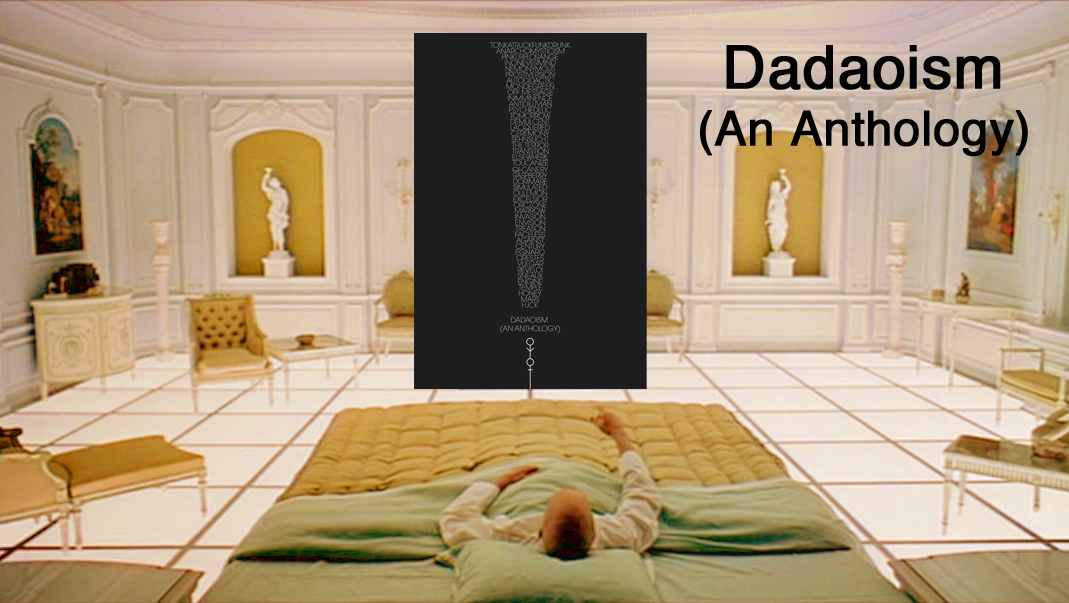
The Cover of Chômu Press’ Dadaoism anthology resembles a certain, familiar monolith. Still from Stanley Kubrick’s 2001: A Space Odyssey (1968).
A year ago, I dispatched my idiosyncrasies overseas. I had been reading the work of a UK-based publishing house called Chômu Press and felt a kinship with their unabashed promise: “If you are tired of tepid, humanistic realism on the one hand, and the narrow fixations of genre on the other, Chômu Press may be what you have been waiting for.” There was something devilishly discourteous about it, but I was intrigued by the Steppenwolf-style invitation to Chomu’s own Magic Theatre. Now, seven years since I originally penned the drug-addled artifact that is “The Lobster Kaleidoscope”, I find it “trippy” to experience it anew within the context of Chômu’s impressive Dadaoism anthology.
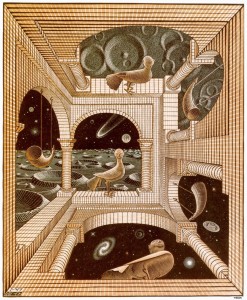
M.C. Escher’s “Another World”
Dos Dazzling Deets re Dadaoism (An Anthology):
1) Metaphysical Portals: As a devotee of Borges, Kafka, and Beckett, I get kicks out of masterful meta-ness, psychological terror, and gallows humor, all of which Dadaoism’s opening piece, “Portrait of a Chair”, possesses in levels of toxicity. In Reggie Oliver’s story, a retired antiques dealer, keenly aware of his mortality, attends an auction where he purchases a captivatingly simple portrait of a chair. The portrait is not just some symmetrical schlock to mount over a mantel, but rather, a metaphysical portal to a dimension in which inanimate objects are paradoxically conscious, and the narrator, having undergone a paralyzing transformation, must fight through telepathic intellect alone to survive. READ MORE >
Landscape Featuring Oklahoma: A Conversation with Letitia Trent

 Editor’s Note: Okla Elliott is the author of From the Crooked Timber, a collection of short fiction. Letitia Trent is the author of One Perfect Bird, a collection of poetry. They corresponded by email.
Editor’s Note: Okla Elliott is the author of From the Crooked Timber, a collection of short fiction. Letitia Trent is the author of One Perfect Bird, a collection of poetry. They corresponded by email.
Okla Elliott:You’ve recently gotten into Martha Wainwright, and I know that music is a pretty serious interest of yours. How has music influenced your poetry? What have you taken from your favorite songs into the best poems you’ve written?
Letitia Trent: I do not come from a big music family: they mostly listen to radio country music. I listened to pop and rock radio constantly as a kid, from ages seven to eleven (I listened to the entirety of Kasey’s Top 40every Saturday, for example, so my knowledge of late 80’s, early 90’s pop music is alarming), and later was one of those teenagers who was obsessive about finding new bands and discovering the webs of musical connections between musicians and genres of music. I read lyrics and liner notes carefully and read every music review I could find, even if it was for music I didn’t know. If I had any musical ability, I probably would be a singer-songwriter.
So, early on, music was a way to connect to the outside world of people who created things. It was more accessible than books and poetry, which were pretty rare for me, as I grew up in a house without many books READ MORE >
Q.E.D. – Part 3: An evening of Authentic Objects
The MAK Center Schindler House, Los Angeles
13 June 2012
Context Note: In April, May, and June of this year, Les Figues Press hosted a short series of long conversations on queer art and literature. Titled Q.E.D., in honor of Gertrude Stein’s novel by the same name (and one of the earliest coming-out stories), each Q.E.D. event explored the constructions of speech, art, literature, materiality, and sex. The conversations were moderated by Vanessa Place at the historic MAK-Schindler House, L.A.’s original nod to green architecture.
Q.E.D. Part Three featured Dodie Bellamy, Julie Bamber, and Terry Castle.
***
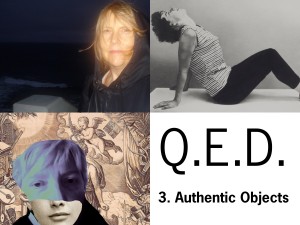
An evening of Authentic Objects: Julie Bamber, Dodie Bellamy and Terry Castle in conversation.
In the third installment of Les Figues Press’ Q.E.D. Series, moderated by Vanessa Place, the initial questions were, “Does an object need a form? Does an objection? Does anything speak for itself?” Artist Julie Bamber, writer Dodie Bellamy and critic (and writer and artist) Terry Castle assembled in the MAK Schindler House in West Hollywood to discuss questions of object-hood before an excited audience.
Patrons gathered, drank Pellegrino and looked at programs. Grapes and cookies sat on a table on the lawn. The copper of the fireplace was bright, next to the concrete walls of the house, with low beams suspended with small lights. A sliding door opened the wall. Afternoon light slanted across the concrete floor, grey.
July 6th, 2012 / 12:00 pm
Q.E.D. – Part 2: WHAT MATTERS/WHAT’S MATTER
The MAK Center Schindler House, Los Angeles
9 May 2012
Context Note: In April, May, and June of this year, Les Figues Press hosted a short series of long conversations on queer art and literature. Titled Q.E.D., in honor of Gertrude Stein’s novel by the same name (and one of the earliest coming-out stories), each Q.E.D. event explored the constructions of speech, art, literature, materiality, and sex. The conversations were moderated by Vanessa Place at the historic MAK-Schindler House, L.A.’s original nod to green architecture.
Q.E.D. Part Two featured Brian Teare, Michael du Plessis, and Lincoln Tobier.
***
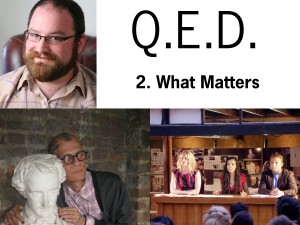
Blocked off by thick and towering bamboo shoots, the hush of the Schindler House is a surprise even given its location on a quiet, residential West Hollywood street. The House belongs to the MAK Center for Art and Architecture in Los Angeles; it was originally built in 1922 as a two-family home and workspace by Rudolph M. Schindler for himself, his wife, and another couple. The House’s then-innovative indoor/outdoor, open-plan design was the basis for the “California houses” that came to litter the landscape throughout the mid-twentieth century. It is hard to imagine anyone actually living in the House as it stands now: almost entirely empty, the structure and its surroundings feel more like a church or a yoga studio. Visitors speak quietly, and it is hard not to step lightly, as if any exuberant move might knock down the concrete walls and let the rest of the world into this sacred bohemia of careful art and right living.
July 4th, 2012 / 12:00 pm
DeAtHbOoK rEvIeWs: Reviews of Books with Death in the Title that We’ve Never Read
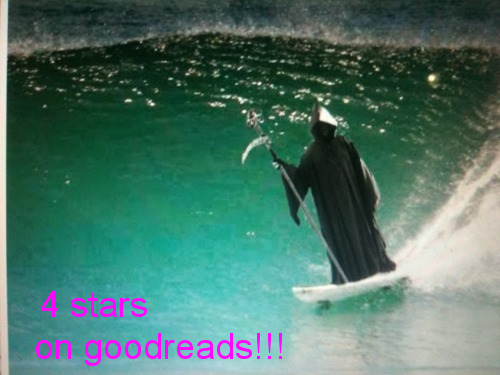
The following are REVIEWS OF BOOKS WITH DEATH IN THE TITLE THAT WE’VE NEVER READ. We’ve done our best to highlight some of the best classic and contemporary books with death in the title that we’ve never read for your very own reading pleasure. Please enjoy (while you still can)!
THE DEATH OF PRINGLE by Justin Katko
The Death of Pringle is a journey through the infinitely depressing matrix of trying to eat less than 10 grams of carbs a day for the rest of your fucking life.
DEATH IN A BOX by Alta Ilfland
Who hasn’t dreamt, on a mundane Monday or frowzy Friday, of starting a tumblr? Tumblrs entice, but is it really all a golden road to viral? Alta Ilfland answers that question with wit, warmth and wicked candor in the chronicle of her own foray into tumblr. Beginning, appropriately enough, on New Year’s Day with a divine idea, Ilfland sets the scene and pits her poetic sensibilities against tumblr. “I had talked about it / during the long gray winters / and the damp green summers…” she writes, “looked / with an addict’s longing / at film stills, dreamed / of waking up in the middle of the night / to reblog.” Indeed, not 10 pages into the book, reality comes crashing into conflict when no one follows her. In verse that skips along lightly, Ilfland records the highlights of each month, from no followers in February to one follower in March to the loss of that follower at Christmas—all the while trading her irl existence for the glow of the screen.
Selection from Q.E.D. – Part 1, “Things Unsaid”
The MAK Center Schindler House, Los Angeles
11 April 2012
Compiled by Chris Hershey-Van Horn
Context Note: In April, May, and June of this year, Les Figues Press hosted a short series of long conversations on queer art and literature. Titled Q.E.D., in honor of Gertrude Stein’s novel by the same name (and one of the earliest coming-out stories), each Q.E.D. event explored the constructions of speech, art, literature, materiality, and sex. The conversations were moderated by Vanessa Place at the historic MAK-Schindler House, L.A.’s original nod to green architecture.
Q.E.D. Part One featured Melissa Buzzeo, Patrick Greaney, and Simon Leung.
***
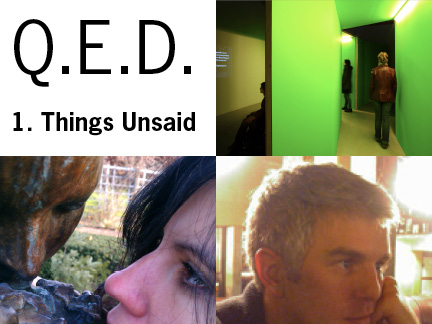
“What happens in a work of art when it seems like the artist does nothing?”—(Patrick)
July 2nd, 2012 / 12:00 pm
Interview with Guillaume Morissette
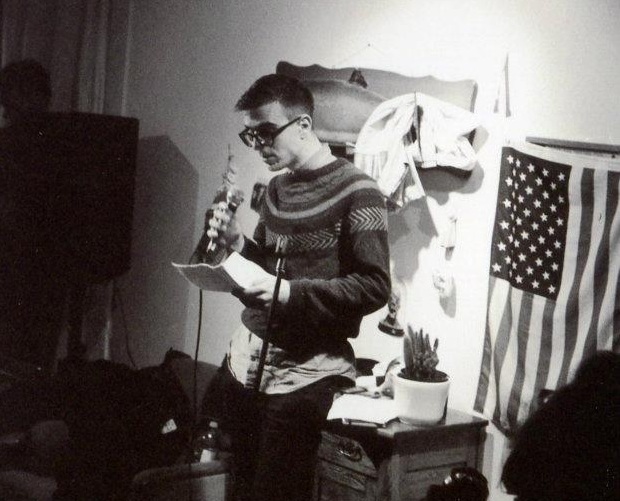
Q: Hi, Guillaume. Who are some of your favorite authors/what are some of your favorite books?
A: A nonfiction book called, ‘A History of Celibacy’, I forget its author. Also Mark Leyner, Clarice Lispector, recent stuff like Lidia Yuknavitch/Tao Lin/Blake Butler, Bill Bissett, older stuff like René Daumal/Ikkyu/Pessoa, canon stuff like Ann Beattie/Lorrie Moore/Lydia Davis/Amy Hempel, Jean Rhys, Alain Robbe-Grillet, some Saul Bellow, ‘The People of Paper’ by Salvador Plascencia, other things.
Q: I’m a big fan of Clarice Lispector. Which one(s) have you read? What do you like about her?
A: I recommend, ‘Hour of The Star’ to people a lot. For a while, she didn’t feel like a human person to me, she felt like some sort of superhuman or terminator sent from the future to write sharp commanding novels with intensely lucid individual sentences, like I read somewhere that after ‘Passion According To GH’, she fell asleep holding a cigarette and injured her typing hand in the fire and then somehow still went on to produce another 8-10 books after that. Then at some point I read, ‘Near To The Wild Heart’, her first novel, and it made me feel closer to her and think of her as a person, and that made me question what I wanted my own writing to make me ‘come across as’, and my answer to that was: flawed, profoundly flawed, but hopefully lucid about the flaws and maybe minimally theatrical about them.

